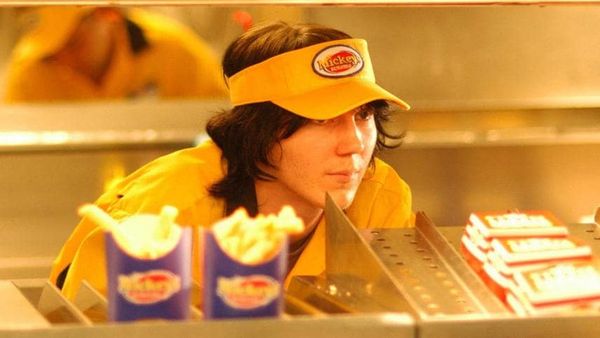Eye For Film >> Movies >> Fast Food Nation (2006) Film Review

There’s no doubt that Eric Schlosser’s horrifying, meticulously researched 2001 exposé, Fast Food Nation, would have made a devastating documentary. By choosing instead to fictionalize his damning indictment of our meat processing industry (the idea, improbably enough, originally came from Sex Pistols impresario Malcolm McLaren), director Richard Linklater was perhaps eager to avoid having his movie tied up for months in litigation with the very people who almost jailed Oprah. The price he paid, though, was a movie filled with information and descriptions that most moviegoers will think are either exaggerated, or false. Sadly, they’re not.
Choreographing more than 40 speaking roles and 100 times that number of cattle, Linklater, who worked closely with Schlosser on the adaptation, is astonishingly successful in creating a coherent, easy-to-follow narrative that encompasses every one of the book’s main issues. His technique is to hang these on a fictional group of people in a single Colorado town, all of whom are connected in some way to the corporate beef industry. Serving as audience surrogate is Don (Greg Kinnear), a mid-level executive with a fast food franchise known, somewhat transparently, as Mickey’s (“Home of the Big One”). Appalled to learn that fecal bacteria have been found on some of the company’s beef patties, Don heads to their supplier in Colorado to investigate.

Meantime a busy coyote named Benny (Luis Guzman) is shepherding his latest load of illegals across the border. Some of these, including sweet-natured Sylvia (Catalina Sandino Moreno), boyfriend Raul (Wilmer Valderrama) and her thrill-seeking sister Coco (Ana Claudia Talancon), are headed for the slaughterhouse, where they will face punishing hours, sexual harassment from the horny supervisor (an excellent Bobby Cannavale) and the omnipresent threat of injury from blood-slicked floors, meat grinders and skinning knives. “Welcome to America!” grins Benny, heading back to Mexico for another load of hopefuls.
Episodic, yet strongly goal oriented, Fast Food Nation struggles to identify a consistent tone. Linklater gets a lot of things right: the densely-packed feedlots filled with mangy cattle, the horror of the killing floor (the movie’s bloodiest scenes were shot inside a Mexican slaughterhouse) and the anonymity of name tag jobs and the families who depend on them. The movie is particularly sharp in its depictions of the Mickey’s board, as they create ridiculous slogans and argue over the difference between “Itty Bitty Burgers” and “Little Big Ones,” with the smirking condescension of people who know their real job is to manipulate customers.
As expected with Linklater, there’s a certain amount of stunt casting, some successful (Bruce Willis as a hardass cattle supplier who reminds Don that “we all have to eat a little shit from time to time”) and some not so much (Ethan Hawke, as the idealistic uncle of a Mickey’s salesgirl). But the film’s biggest problem may be its lack of resolution, with major characters fading out of the plot and others left with unresolved tragedies (Sylvia and Raul), or unsatisfied suspicions (Don).
Despite all the blood on screen, Fast Food Nation is a strangely anaemic movie. Caught between earnest muckraking and teasing satire - you can sense Linklater’s reluctance to make jokes about something so dreadful as feces-saturated meat - the movie hovers irresolutely above the fray, diluting the controversy and creating an emotional distance that drains energy from the plot and outrage from the audience.
At Cannes (2006), Linklater called his movie “the Nashville of meat,” but his courting of sensationalism is more Paul Haggis than Robert Altman. Nevertheless, he has made a valiant attempt to grab our attention, even as he shows signs of knowing that his film is problematic.
Late in the movie, as though venting his own frustration, he has a bunch of inept eco warriors attempt to liberate a pen, filled with placid cows. When the animals refuse to move, the kids are bewildered. “Next time we'll have to bring a cattle prod,” sighs one, in a line that sounds suspiciously like what the director would love to do to the American public.
Reviewed on: 03 Feb 2007




















